






You stopped the mine on our beloved Smith River. On April 11, Montana Trout Unlimited received word on our court challenge that we won both the MEPA and MMRA claims we filed against the Black Butte Mine and DEQ. Your donations, letters, phone calls, and time helped us achieve this victory. This marks a rare moment in Montana history that a mine has been stopped because it poses serious environmental risks. Thank you!
In its ruling, the Court stated: “Plaintiffs claim that DEQ failed to ensure the safety and stability of Tintina’s tailings storage facility, failed to prevent excessive nitrogen from entering Sheep Creek and contributing to algal blooms that choke out fish and other aquatic life, and failed to consider reasonable alternatives to alleviate or avoid potential environmental harms….This Court finds that DEQ’s decision to permit the Black Butte Copper Mine was arbitrary, capricious, and unlawful.“
As you know, MTU joined MEIC, EarthWorks and American Rivers to challenge, in district court, that MT Department of Environmental Quality (DEQ) did not properly or sufficiently evaluate the risks this mine poses to water quality, quantity and the Smith fishery under the Montana Environmental Policy Act (MEPA) and MT Metal Mine Reclamation Act. The first and only hearing was held on July 16th, 2021, and the decision came in our favor of all of our claims about the risks the mine poses.
If we’ve learned anything in this fight, it is that there are always more rounds, so while we are celebrating this win, we remain poised for our next action. We are also still committed to the mineral withdrawal on public lands that will provide an additional layer of protection for the Smith River.
We could NOT have accomplished historic protection without you.
Thanks for all you do for trout in Montana and everywhere!

David Brooks
Executive Director
Montana Trout Unlimited
The Winter 2022 issue of Trout Line is out now. Read it below on your browser or download a PDF for your screen reader HERE.
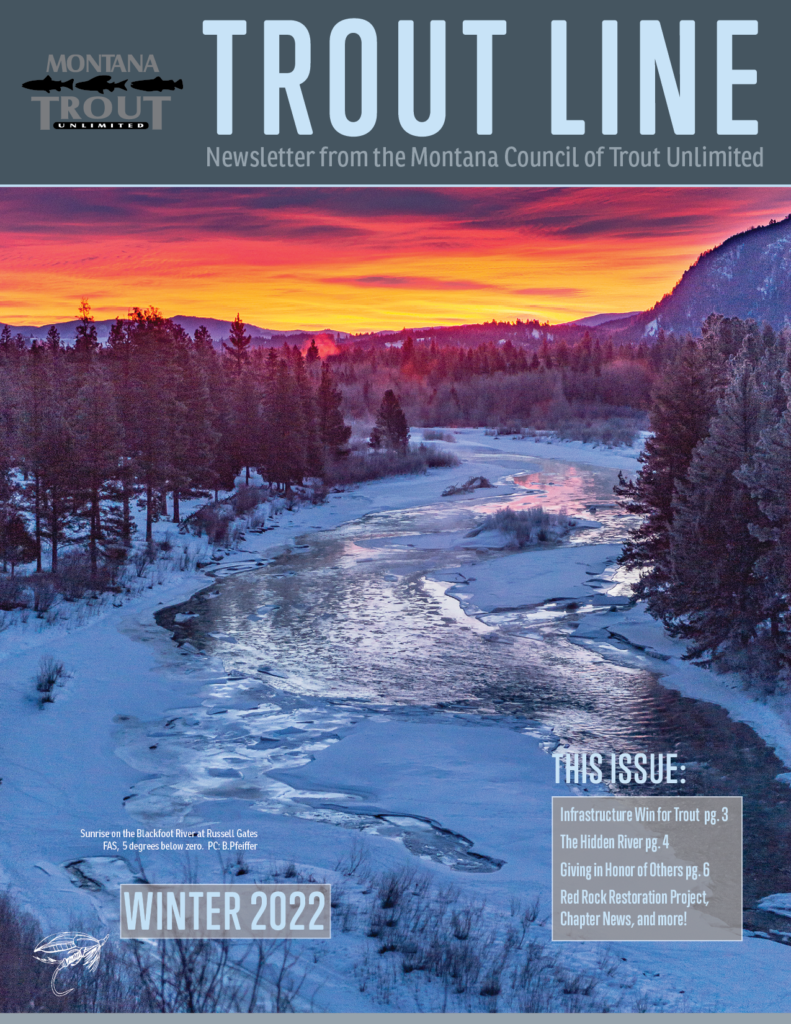

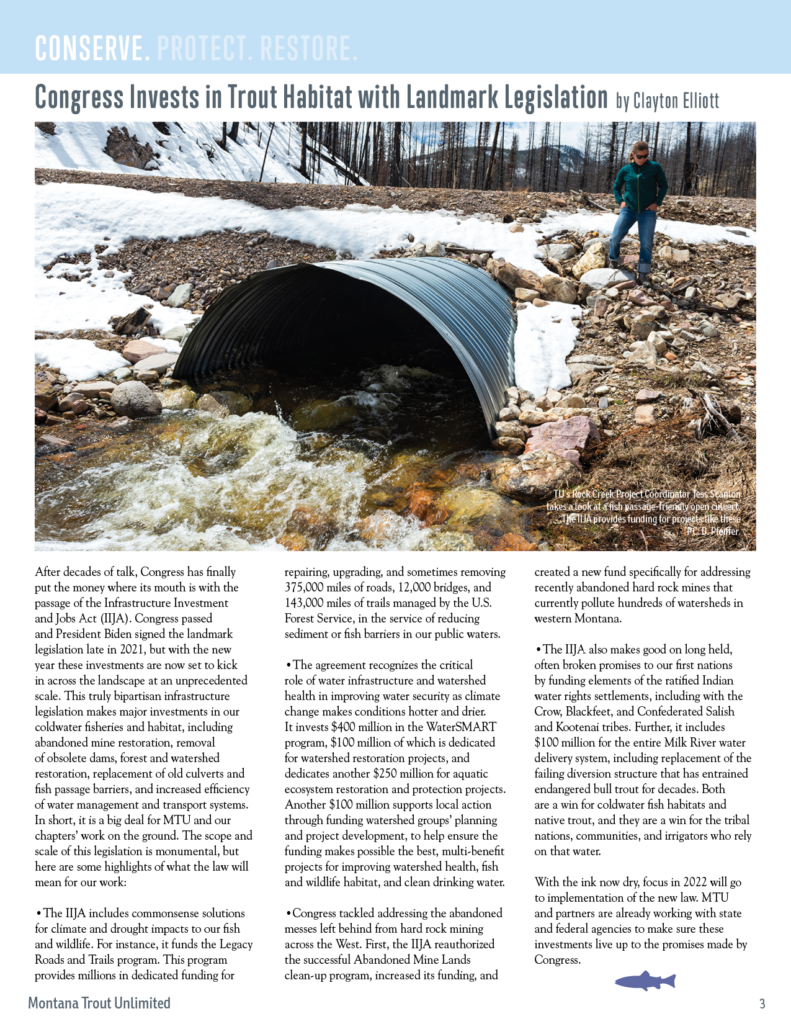
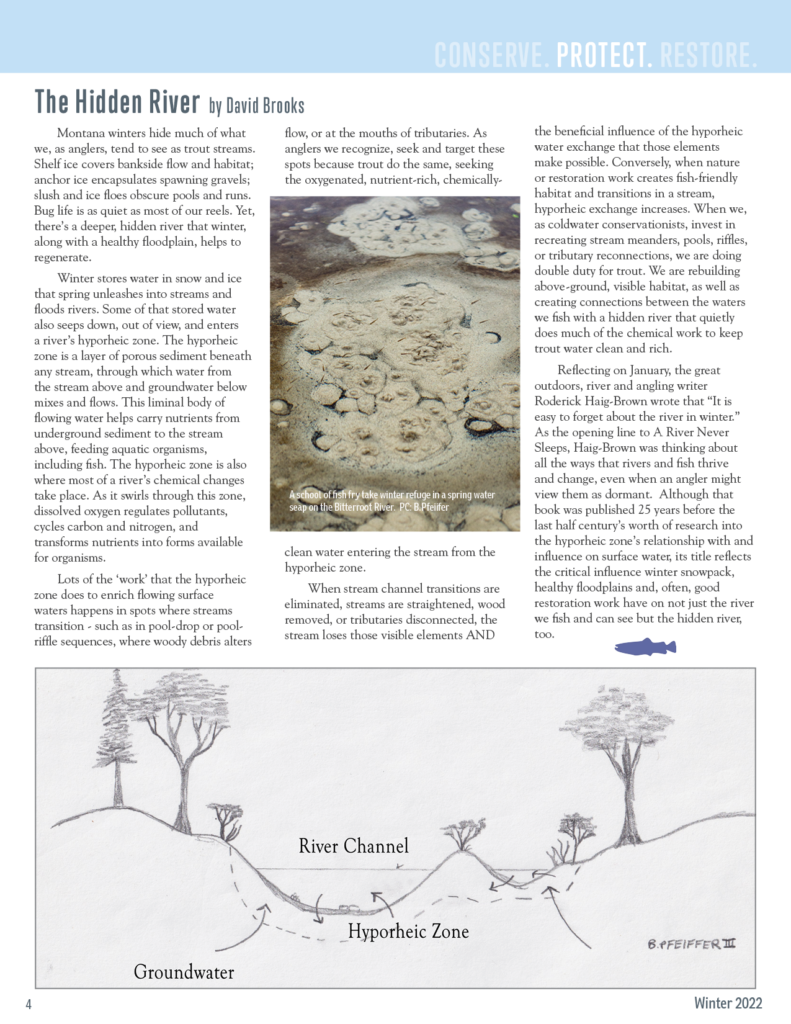
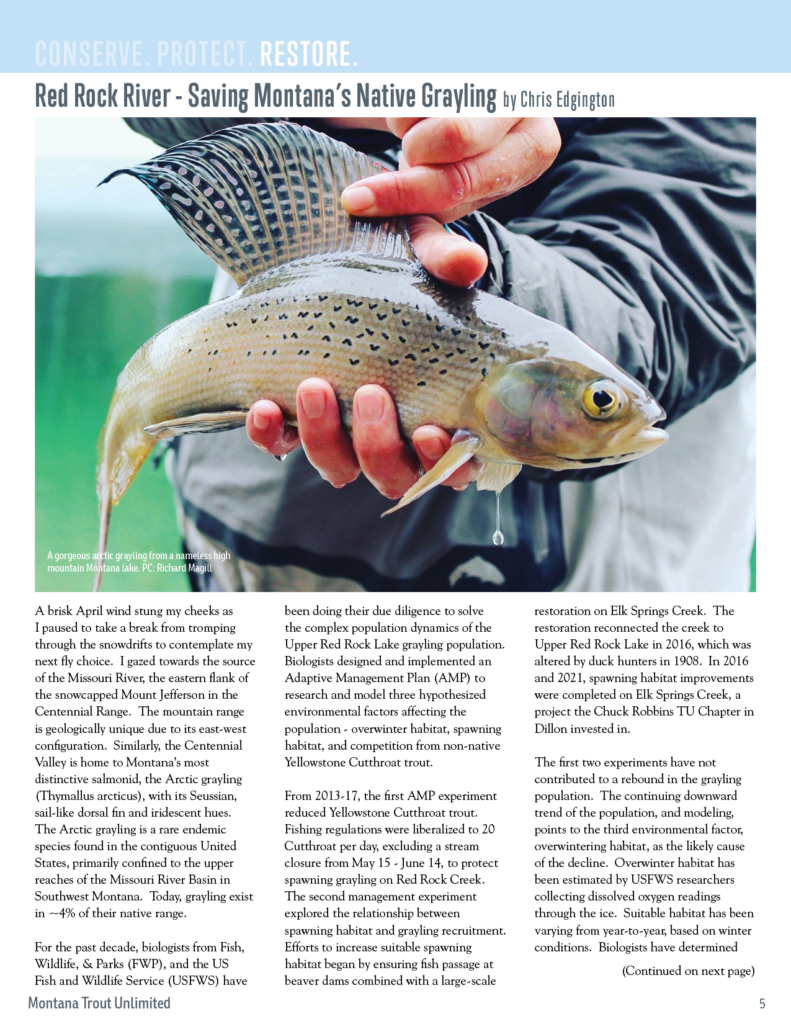
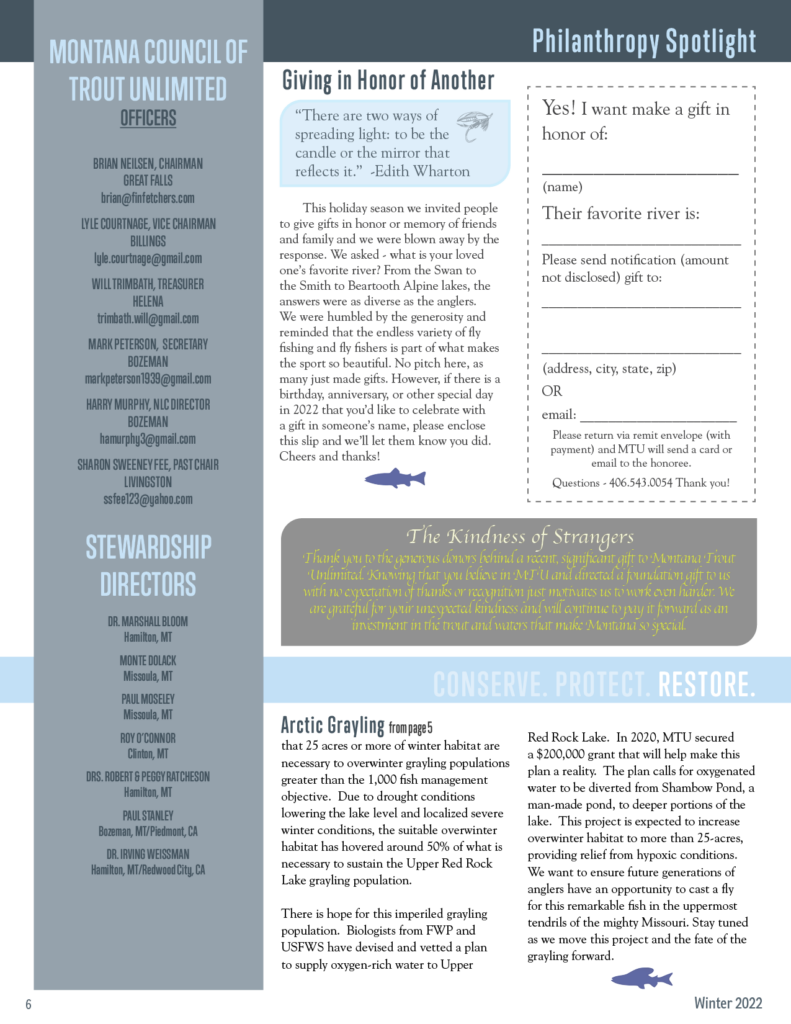
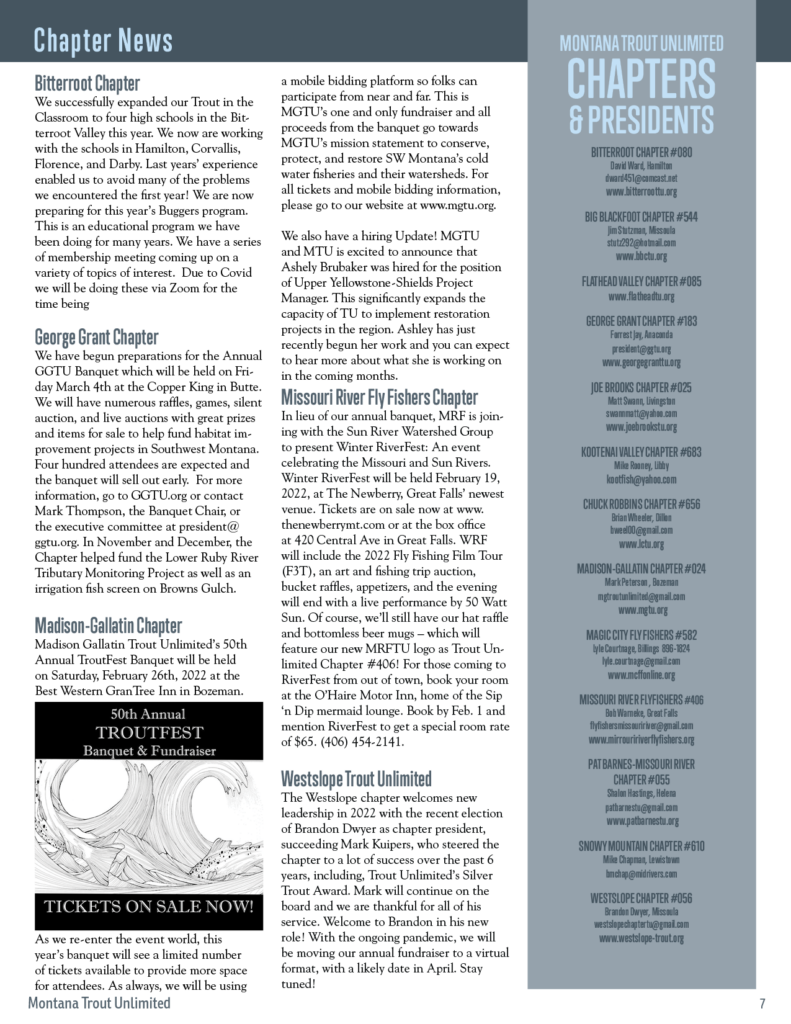

Montana’s Department of Environmental Quality (DEQ) is proposing to roll back water pollution protections that safeguard our stream and rivers, putting our cold-water fisheries, drinking water, human health, outdoor recreation, and agricultural heritage at risk. Let them know you oppose this effort. Comments are being accepted until February 8, 2022. Email [email protected] to make your comment.

Background: In April, 2021, Governor Gianforte signed the most dangerous dirty water bill from last year’s legislative session, Senate Bill 358, into law. SB 358 revises Montana’s model water quality standards for river and stream health in two substantive ways.
First, it wholesale eliminates the EPA-approved numeric nutrient criteria that protect waterways from degradation and replaces those well-established, enforceable numeric criteria with an ambiguous, unenforceable, write-as-you-go adaptive management program for nutrients. Second, it greatly expands pollution exemptions for polluting industries discharging into our waterways.
With the passage of SB 358, Montana went from being a national leader in adopting numeric nutrient standards that protected most of our waterways from harmful algal blooms driven by nitrogen and phosphorus pollution, to being the first state in the country to eliminate a proven science-based approach for protecting water quality.
Rolling-back science-based water quality standards threatens Montana’s world-class rivers, outdoor recreation, human health, agriculture and the public trust:
The proposed narrative standards allow DEQ and polluters to wait to react to the negative impacts of pollution, like harmful algal blooms, after they happen, rather than preventing those impacts. Restoring waterway and river health once polluted is a more costly and time-consuming endeavor than proactively managing point-source pollution from the start.
Need help writing your comment?
SAMPLES HERE
Science Should Guide Water Quality Standards: By rolling back science-based, enforceable water quality standards for nutrient pollution, Montana DEQ will have to wait for a visible pollution event to occur before addressing the problem and taking any enforcement action against nutrient pollution discharges. We shouldn’t rely on reactive, subjective, write as you pollute processes and enforcement when it comes to the health of our waterways.
The “incremental” ‘adaptive management’ approach proposed in the new rule is not only an unenforceable concept that fails to protect our local waterways from pollution, but it is also reactive in nature, encouraging a ‘wait and see’ approach to pollution impacts, including potential mass fish kills, nuisance or even toxic algal blooms, or worse, before the root cause of the pollution is addressed.
Montana is Taking a Giant Step Backwards: Montana was a national leader adopting science-based, enforceable water quality standards for nutrients in 2015, and we’re now the first in the country to remove strong, science-based nutrient standards that protect our rivers from harmful algal blooms. In the face of climate change, warming water temperatures, variable snowpack and runoff, river flows and persistent drought, the rollback of enforceable numeric standards has put Montana’s waterways in even greater peril. Comment to MT DEQ (email: [email protected]) before Feb. 8, 2022 and ask them to protect our water quality!

Many of you may remember MTU’s long history in standing up for the protections our streams have under the Clean Water Act. The EPA is proposing a new policy that would be the first step in restoring protections for small streams, headwaters, and wetlands that are critical to a healthy and functioning water system.
This “Waters of the United States” rule – better known as WOTUS- is based in sound science (and good common sense): If we pollute upstream, we put downstream waters at risk.
Millions of miles of streams and millions of acres of wetlands lost Clean Water Act protection under the previous administration. Now we have a chance to see that they’re protected going forward.
This proposal would officially roll back the previous administration’s rule and largely return to earlier guidelines. Speak up today on behalf of the rivers and streams we care so much about, and the watersheds we are working so hard to conserve.
And then stay tuned. Later this year, the EPA will release a new definition of “Waters of the United States” covered by the Clean Water Act, and MTU and TU will be working hard to ensure it provides lasting protections for small headwater streams.
Wrappin’ & Rappin’ is Montana TU’s new video podcast series, focusing on signature flies from some of the state’s premiere waters, as well as discussions about conservation in the places our guests know best. Each week we tie a fly and chat! In this episode, we focus on the Smith River and the Gonzo streamer, popularized by Joe Sowerby of MT Fly Fishing Connection. Our guests our MTFFC guides Will Plumhoff and Jason Brininstool. We discuss this year’s drought and how the river fared, hear some stories of the Smith’s infamous weather, and talk best boat camps, including one that may be haunted! Enjoy!